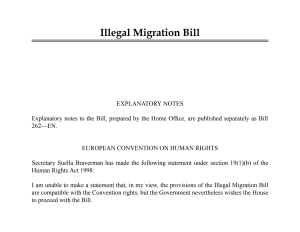by Dr Kathryn Allinson, the Law School University of Bristol,
The Illegal Migration Bill was presented to Parliament this week, proposing to ‘prevent and deter unlawful migration’. It will do so by obligating the Home Secretary to detain and remove anyone who arrives in the UK irregularly whilst denying them access to asylum procedures and appeals. The only exception is unaccompanied children and those to whom removal would cause ‘serious and irreparable harm’. However, the Bill will not deter people from coming to the UK. Instead, the provisions of the Bill, if enacted, would place asylum-seekers in prolonged administrative limbo and result in legal challenges before the European Court of Human Rights (ECrtHR). (more…)




